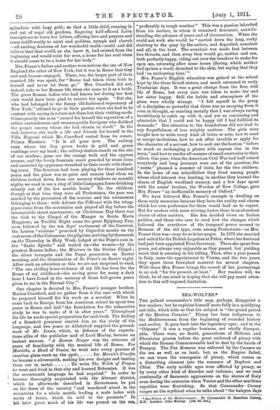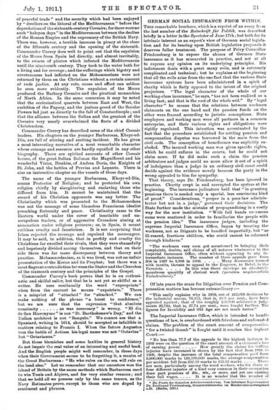SEA-WOLVES.* Thu gallant commander's title may, perhaps, disappoint a few
readers; but he explains himself more fully in a qualifying sub-title, which tells us that his subject is "the grand period of the Moslem Corsairs." Piracy has been indigenous to the Mediterranean from the beginning of recorded history and earlier. It goes back into the legendary ages ; and in the "Odyssey" it was a regular business, not wholly disreput- able. There were, no doubt, generations of Hellenic and Phcenician pirates before the great outbreak of piracy with which the Roman Commonwealth had to deal by the bands of Pompey. The Fax Romance was enforced by the Caesars on the sea as well as on land; but, as the Empire failed, we can trace the resurgence of piracy, which comes as a disturbing element into the romance of -Daphnis and Chloe. The early middle ages were afflicted by piracy, as by every other kind of disorder and violence; and we read continually of Saracenic aggressions on the shores of Italy even daring the centuries when Venice and the other maritime republics were flourishing. So that Commander Cum," verges on the mythical when he talks about "the halcyon days
• Soa-Woloes of the Mediterranean. By Commander H. Hamilton Currey, B.H. London ; John Murray. [10m. ed. ne$4 of peaceful trade" and the security which had been enjoyed by " dwellers on the littoral of the Mediterranean " before the depredations of the sixteenth-century Corsairs; for there were no such "halcyon days " in the Mediterranean between the decline of the Roman Empire and the supremacy of the British Navy. There was, however, a terrible increase in piracy at the close of the fifteenth century and the opening of the sixteenth. Commander Currey does well to point out that the expulsion of the Moors from Spain led directly, and almost inevitably, to the swarm of pirates which infested the Mediterranean until the nineteenth century. They took to the water both for a living and for revenge ; and the sufferings which bigotry and covetousness had inflicted on the Mohammedans were not returned by them on the Christians without a certain amount of rude justice. At any rate, cause and effect can seldom be seen more evidently. The expulsion of the Moors produced the Barbary Corsairs and the piratical monarchies of North Africa. In the same connexion it may be noted that the ecclesiastical quarrels between East and West, the ambition of the Papacy, and the jealous greed of the Secular Powers led just as directly to the fall of Constantinople ; and that the alliance between the Sultan and the greatest of the Corsairs very nearly overwhelmed the fleets of a divided Christendom.
Commander Currey has described some of the chief Corsair leaders. His chapters on the younger Barbarossa, Kheyr-ed- Din, are full of stirring and exciting incident. He has given a most interesting narrative of a most remarkable character whose courage and resource are hardly equalled in any other biography. There are spirited accounts of other Corsair heroes, of the great Sultan Soliman the Magnificent and his wonderful Vizier, Ibrahim, of Andrea Delia, the Knights of St. John, and the battles of Previsa and Lepanto. There is also an instructive chapter on the vessels of those days.
The name of the younger Barbarossa, Kheyr-ed-Din, means Protector of Religion ; and he protected his own religion chiefly by slaughtering and enslaving those who differed from him. It cannot be maintained that the record of his Christian opponents was any better. The Christianity which was presented to the Mohammedans was not the message of some blameless Franciscan idealist preaching fraternity and peace. Christianity came to the Eastern world under the cover of insatiable and un- scrupulous traders, or of aggressive Crusaders aiming at annexation under religious pretexts ; or, in Spain, it meant ruthless cruelty and fanaticism. It is not surprising that Islam rejected the message and repulsed the messengers. It may be said, in addition, that in perfidy and cruelty the Christians far excelled their rivals, that they were shamefully and hopelessly divided among themselves, and that on their side there was far more discrepancy between theory and practice. Mohammedanism, as it was lived, was not an unfair presentation of the Koran and its Prophet; but there was a most flagrant contradiction between the States and the Churches of the sixteenth century and the principles of the Gospel.
Commander Currey's book proves that he is an enthusi- astic and skilful sailor, but that he is not yet so skilful as a writer. He uses continually the word "expropriate" when from the context he means " expatriate." There is a misprint of " attached " for "attacked." We can make nothing of the phrase "a burst to confidence," but we are sure that the expression " that absolute unanimity as was necessary " is wrong. " El dig de San Rieronymo " is not " St. Bartholomew's Day," and the Italian architect is not " Sangnlo." We cannot see that a Spaniard, writing in 1614, should be accepted as infallible in matters relating to Francis L When the future Augustus won the battle of Actium his legal name was not " Oetavins " but " Octavianus."
But these blemishes and some laxities in genera/ history do not impair the real value of an interesting and useful book. And the English people might well remember, in these days when their Government seems to be forgetting it, a maxim of the Great Barbarossa : "He who rules on the sea will rule on the land also." Let us remember that our ancestors won the island of Britain by the same methods which Barbarossa used to win Tunis and Algiers, and for very similar reasons ; and that we hold all we possess only by the same tenure, as the Navy Estimates prove, except to those who are duped by sentiment and phrases.















































 Previous page
Previous page